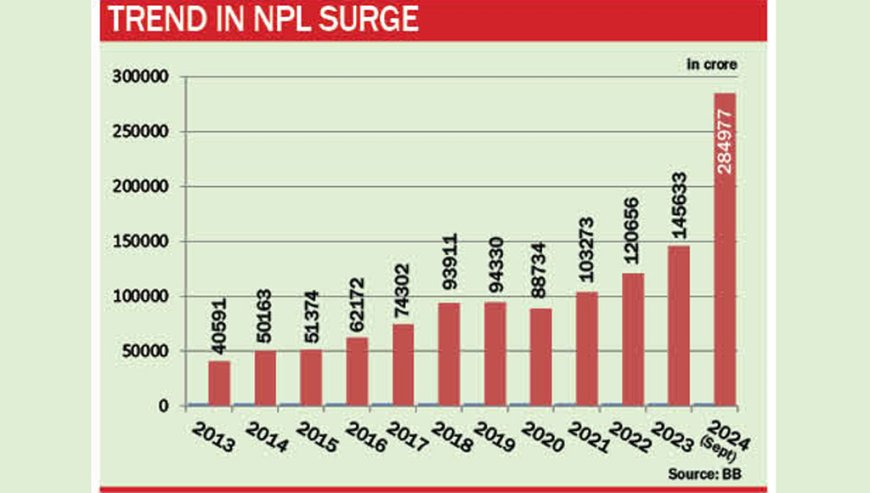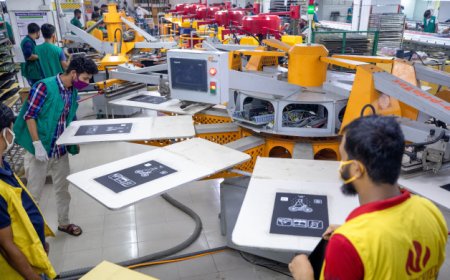Defaulted loans rise to Tk 2.85 lakh crore
Defaulted loans rise to Tk 2.85 lakh crore

The volume of non-performing loans (NPLs) in Bangladesh's banking sector surged to a staggering Tk 2.85 lakh crore in September, following the implementation of stricter regulatory practices, reduced data manipulation, and the adoption of international standards in classifying such loans.
According to data from Bangladesh Bank, NPLs increased by over Tk 1 lakh crore, rising from Tk 1,82,295 crore at the end of March to Tk 2,84,977 crore in September. About 17% of the total bank loans, which amount to Tk 16.82 lakh crore, are now classified as non-performing, marking the highest ratio in South Asia.
Bankers explained that during the Awami League-led government, significant sums were borrowed from banks under fake names, which are now emerging as defaulted loans. These loans were previously reported as 'regular' due to data manipulation and lenient policies, such as frequent loan rescheduling.
After the fall of the Awami League government on August 5, the true extent of these irregularities started to become visible. Banks previously under the influence of the controversial S Alam Group have started disclosing more accurate loan data. For example, the NPLs reported by Islami Bank doubled in September, while other banks also reported a significant rise in defaulted loans.
Large business groups like Beximco, Bashundhara, S Alam, and Orion, which were allegedly linked to the previous government, have seen their loans default. Additionally, several businesspeople with ties to the ousted Awami League government either ceased operations or went into hiding, leading to missed loan repayments.
The default loan figure stood at Tk 2,11,391 crore at the end of June and Tk 1,45,633 crore in December 2023. The total amount of defaulted loans has grown by Tk 2,62,737 crore since 2009 when the Awami League came to power, from Tk 22,240 crore at that time.
This sharp rise in defaulted loans is attributed to regulatory leniency, undue privileges given to large borrowers, and insufficient enforcement against defaulters. Husne Ara Shikha, a spokesperson for Bangladesh Bank, explained that the rise in NPLs reflects the central bank’s move to adopt international standards in calculating such loans. The time period for classifying overdue loans as non-performing was reduced from six months to three months starting from the September quarter.
Stricter monitoring has reduced opportunities for data manipulation, contributing to the increase in reported defaulted loans. Experts noted that recent political unrest and economic stagnation further exacerbated the situation, making it harder for many businesses to meet their repayment obligations.
Concerns have been raised about the long-term impact of rising defaulted loans on both the banking sector and the broader economy, with many of these loans allegedly linked to political influence and financial lobbying.
Criticism has been directed at Bangladesh Bank for not curbing the rise in defaulted loans or addressing irregularities in the banking sector. Calls have been made for a thorough audit of all loans to uncover the full extent of the losses and ensure accountability.
Mustafizur Rahman, a distinguished fellow at the Centre for Policy Dialogue, pointed out that many loans were granted without proper scrutiny, leading to defaults. He suggested that banks speed up the recovery of assets from defaulters and implement stricter loan approvals to prevent future defaults.
Rahman also cautioned against penalizing legitimate borrowers affected by economic disruptions and recommended that Bangladesh Bank adopt a balanced approach to protect reliable borrowers from default.
By the end of September, the total defaulted loans in private commercial banks reached Tk 1,49,806 crore, up from Tk 70,981 crore in December 2023. Defaulted loans in state-owned commercial banks increased to Tk 1,26,111 crore from Tk 65,781 crore in December. In foreign commercial and specialized banks, defaulted loans surged to Tk 3,245 crore and Tk 5,813 crore, respectively, by September.
The increase in defaulted loans is partly attributed to relaxed repayment terms during the COVID-19 pandemic, including a one-year moratorium on repayments. Experts have also suggested that if written-off, rescheduled, and unrecovered loans are considered, the total volume of defaulted loans would be much higher. The substantial volume of defaulted loans is impacting banks' liquidity and profitability, as most of their income comes from interest on performing loans.
What's Your Reaction?





















































































